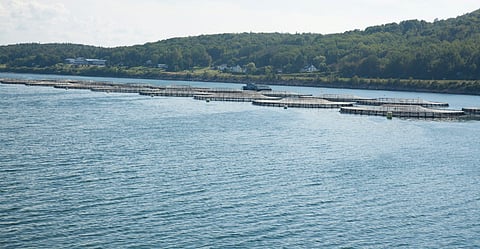

The Canadian Council of Fisheries and Aquaculture Ministers (CCFAM) met at the end of June to discuss the various aquaculture and fisheries priorities of each of the regions. Murray took the opportunity to reiterate to all provincial and territorial representatives that the implementation of a federal plan for the transition to open net salmon farming in British Columbia coastal waters will not be extended to Eastern Canada.
During the meeting, the ministers discussed working together on managing the threat of aquatic invasive species, continuing to support the sustainability and economic well-being of the seafood sector, and safeguarding the future of fish, fish habitat, fisheries, and aquaculture in a changing climate.
CCFAM is Canada's primary forum for multilateral engagement between federal, provincial, and territorial governments to address fisheries and aquaculture issues of pan-Canadian importance. Usually annual, this year's meeting was held only 7 months after the last one and amid the debate over the future of aquaculture in British Columbia, where the controversy between Minister Murray and the industry has been almost constant since the announcement last year of the Open-net Pen Aquaculture Transition Plan, whose deadline has recently been extended.
On this occasion, Joyce Murray used the meeting to reiterate that the implementation of a federal plan to transition to open net pen salmon farming in the coastal waters of British Columbia will not be extended to Eastern Canada. In this part of the country, the main regulator for the management and development of aquaculture is not the federal government, but the provinces themselves. According to the note made public by the CCFAM, the Minister took advantage of the meeting to express her support "for a sustainably managed aquaculture industry, and recognized that aquaculture is a legitimate user of the waters in Eastern Canada."
"Canada's vast aquatic resources, climate and biodiversity are interconnected. Meeting with ministers from coast to coast to coast, to discuss matters relating to both oceans and freshwater bodies, provides the Government of Canada an excellent opportunity to listen to and learn from different perspectives, and to align our priorities," said Joyce Murray, Minister of Fisheries, Oceans and the Canadian Coast Guard.
Fisheries and Oceans Canada (DFO) used the Canadian Council of Fisheries and Aquaculture Minister's meeting to present the Kunming-Montreal Global Biodiversity Framework adopted by the federal government to the ministers of the various territories. The aquatic ecosystem elements of the framework, such as marine conservation, aquatic invasive species (AIS), and climate change, were specifically addressed.
Regarding the threat of ISAs, Ministers agreed that the 2004 CCFAM Canadian Action Plan needs to be revitalized to prevent and mitigate them. The Action Plan identifies gaps in ISA management policy and provides recommended actions related to governance, data sharing, risk prioritization, response, and biosecurity.
In addition, as a follow-up to their previous meeting in November 2022 in Winnipeg, Manitoba, Ministers continued discussions on the impact that climate change is increasingly having on Canada's marine and freshwater ecosystems, in particular, impacts on fish, fish habitats, aquaculture, and fisheries. They agreed that the Climate Change Committee will support marine and freshwater fisheries and aquaculture in this changing environment.
During the meeting, attendees also discussed the importance of early engagement and collaboration with provincial and territorial jurisdictions, indigenous communities, and industry. Indeed, the Ministers had met with representatives of National Indigenous Organizations in a separate session prior to the CCFAM session. The strengthening of relations and the inclusion of the rights and perspectives of indigenous communities in all matters related to fisheries and the conservation of aquatic ecosystems were the focus of discussions.
As mentioned, the Canadian Council of Fisheries and Aquaculture Ministers is the principal forum for multilateral engagement between federal, provincial, and territorial governments. Its primary mandate is to promote inter-jurisdictional cooperation on marine and freshwater fisheries and aquaculture issues, and to provide a forum for establishing and meeting common objectives.
Graydon Smith, Minister of Natural Resources and Forestry for Ontario and co-chair in this meeting summed it up by saying: "Through this forum, we are continuing to build on the significant progress we've made towards a more prosperous and sustainable future in these sectors – not only for Ontario, but for the entire country."
